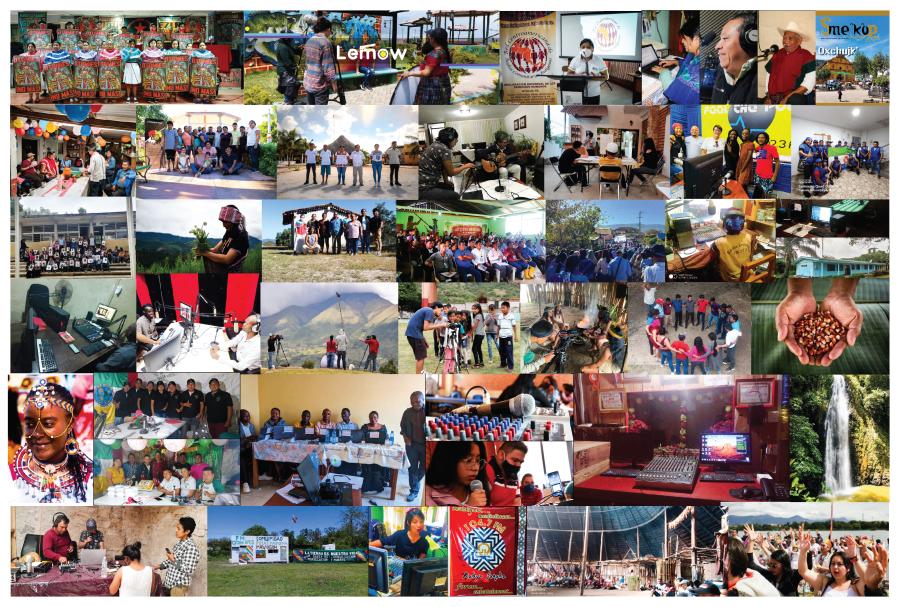
On International Youth Day 2022, Cultural Survival is pleased to announce our 2022 Indigenous Youth Fellows as part of the Capacity Building Program. Our Fellowship Program supports young Indigenous leaders between the ages of 16-28, who are eager to learn about technology, program development, journalism, community radio, media, and Indigenous Peoples’ rights advocacy. This is the fifth year of the Fellowship Program, which has awarded 46 fellowships to 77 youth to date. The capacity of the fellows is built through trainings in communication and technical skills such as radio, audiovisual media, and journalism, and culminates in the successful delivery of media projects.
Fellowships have allowed youth to build capacities in Indigenous rights, Indigenous languages, cultures, and Traditional Knowledge. It is an opportunity to assist fellows to represent the voices of their communities and bring awareness of local issues to global conversations through their proposed projects while strengthening their cultural identities and leadership. We believe that youth hold the power to shift the dynamics of the world. If we want lasting change, we must support Indigenous youth leaders in making that change possible. The participation of our Indigenous youth is crucial in strengthening self-governance, protecting land rights, fighting climate change, containing the loss of biodiversity, restoring ecosystems, and stewarding our cultural heritage.
Meet our first cohort of 2022 Fellows!
Aarati Linkha (Yakkha) from Nepal
Aarati Linkha (Yakkha), 20, from the Kirat Yakkha community in Nepal, is an undergraduate student pursuing a law degree. She is an enthusiastic and aspiring youth who wants to work in the field of protecting and promoting her Yakkha culture and language, which is on the verge of going silent. Aarati is a member of Naya Yuba Naya Soch Sewa Samaj, an organization in Nepal that works in the field of empowering youth. She plans to pursue her career in the legal field and be the voice of the voiceless. Being away from home since her fourth birthday for better schooling, she never got the chance to have a close look at her Indigenous language and culture during her childhood, which led her to face an identity crisis. She also witnessed drastic environmental change and unmanaged urbanization in Indigenous communities’ which led her to advocate for Indigenous rights and work in the field of environmental protection. She writes and advocates for women’s rights and gender equality: “I won’t be satisfied with my women's rights until every single rural and Indigenous woman gets to know about her rights.”
Her fellowship project, “Youths for protection of Yakkha Culture,” aims to promote and strengthen the Yakkha culture, language, and traditional teachings among Yakkha youth. The younger Yakkha generations will be encouraged to learn more about their language and culture through their participation in creating radio programs on the Yakkha culture. Workshops will be conducted to build their skills in community radio and revitalize their Indigenous identity.
Alejandra Santiago Donghu (Hñañhu) from Mexico
Alejandra Santiago Donghu (Hñañhu), 22, is originally from the community of Gonzales Ortega, municipality of Santiago de Anaya. She currently lives in the community of Cerritos in the State of Hidalgo. She is in her final semester at the UAEH campus Actopan where she is earning a bachelor's degree in psychology, and she is a program announcer at the Ximai community radio station. Ximai is a member of the Community Radio Network of México, A.C., a national network of 62 Indigenous communities and radio stations serving the communities in defense of human rights and exercising freedom of expression with an alternative vision of communication and diverse content on gender perspective. Through community radio, Alejandra has been able to transmit the knowledge of her Hñañhu culture and learned to speak the dialect.
Her fellowship project, “Mets’i,” seeks to strengthen and empower youth participation in Community Radio Ximai not only as listeners, but as communicators who can share their experiences and creativity while enhancing their skills in community radio. Four capacity building workshops will be conducted with six youth in radio production, Hñañhu language and culture to promote Indigenous identity, and artistic creation to create more diverse radio productions in different media through the leadership and stories of young creators. Ximai Radio will broadcast the final products. The aim is to generate the revitalization of Hñañhu culture, and for more Indigenous youth to see Ximai radio as a source of trust and a space to strengthen their leadership.
Carina de Souza Moraes (Horopakó Desana) from Brazil
Carina de Souza Moraes (Horopakó Desana), 28, is from Novo Airão in the Amazon region of Brazil. She is a teacher in training who has worked in Indigenous communities in the fight for access to digital technology in schools. Today, she advocates for the right for Indigenous cultures to be part of school curricula and incorporated into the colonial education system to keep the Indigenous cultures alive among future generations. She is in the process of applying for a Law course to strengthen her dream of having a society that respects diversity. Carina says, “With the young Indigenous protagonists of this modern era, we can deselect the canvases with an annatto and genipap, without fear and without shame. Today, our Indigenous youth are agents of a new era, proudly, without fear, or shame wearing traditional body painting with urucum and genipap, the millenary paint from the forest.”
Her fellowship project, “Pehkame Mashã,” aspires to build capacity for 12 young people in leadership and community media to actively participate in social transformations in their communities, “reforesting” good ideas and good practices driven by artistic expression and visual media tools. Workshops will be conducted on audiovisual production, freedom of expression, photojournalism, and communication that will strengthen their management and networking skills and Indigenous identity and culture.
Cristina Ochoa Ochoa (P’urhépecha) from Mexico
Cristina Ochoa Ochoa (P’urhépecha), 28, is from Charapan, Michoacan, Mexico. She is a historian, manager, and cultural promoter currently studying for a diploma in Preservation of Sound and Audiovisual Archives from the National School of Conservation and Museography and National Fonoteca. In 2020, she founded the Amor de Meseta Collective, an audiovisual community communication with the objective of managing, collaborating, and executing actions and projects related to community knowledge and the preservation of the P'urhépecha identity, oral tradition, art, culture, and technologies.
Her fellowship project, “Pretextos Visuales,” aims to strengthen and promote the P'urhépecha culture through physical and digital photography. Workshops will be delivered to 20 P'urhépecha girls and boys teaching the different forms of photography. Participants will create portraits that will be embroidered with the traditional P'urhépecha technique and will be shown at a final photographic exhibition. Additionally, four new murals located in different areas of the community will promote the Purhépecha language.
Daniele Silva Rodrigues (Guajajara) from Brazil
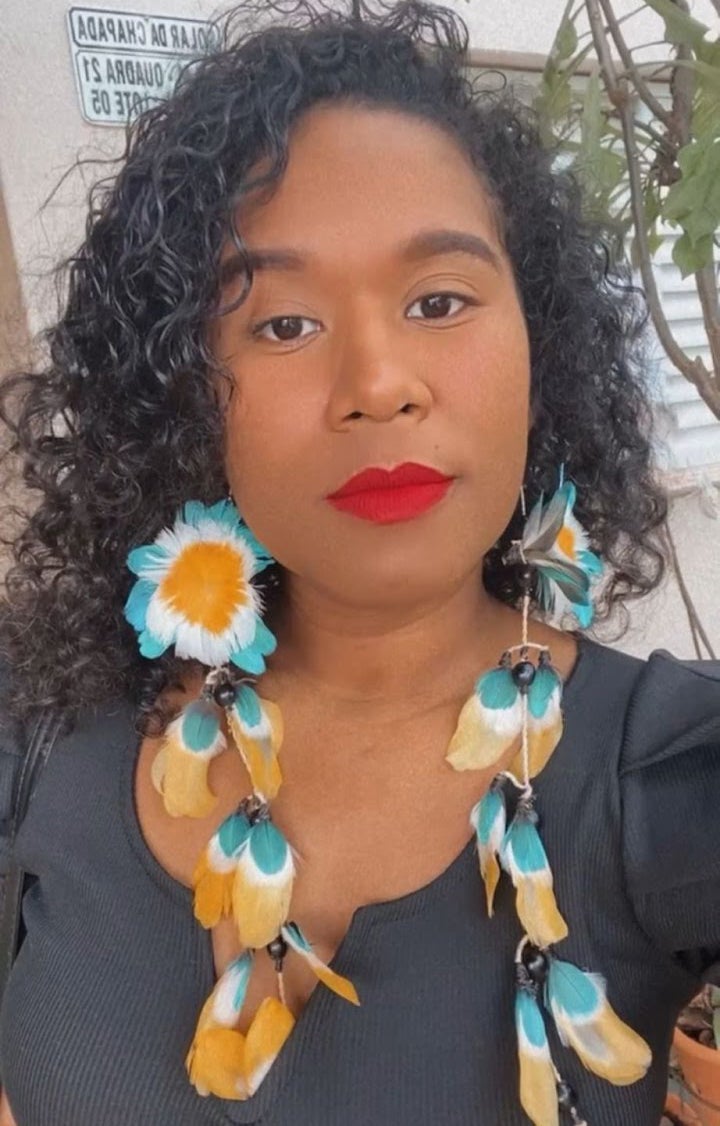
Daniele Silva Rodrigues, 24, is from the Guajajara People of the Arariboia community in Maranhão, Brazil. She is part of the communications team at the National Articulation of Indigenous Women Ancestrality Warriors (ANMIGA). Daniele has been active in the Indigenous movement since childhood, always following the causes and rights of Indigenous Peoples. In 2021, at the second march of Indigenous Women (with almost 6,000 women from different Indigenous Nations), she helped to mobilize networks, printed graphics, and distributed audiovisual content to make visible the resistance of Indigenous women.
Her fellowship project, “The ComunicAgir project: ‘Media and Rights of Indigenous Girls,’” aims to involve Indigenous youth in Maranhão to strengthen young Indigenous women in the fight against gender-based violence and in defense of Mother Earth. Workshops will be delivered informing young Indigenous women of their rights, as well as the development of audiovisual material and other forms of media such as newsletters, music, and communication as a tool. Content will be developed from the workshops for social media distribution. Exchanges will also be organized to enhance the network of young Indigenous women who have been victims of violence and to discuss the importance of Indigenous women as protagonists in political and decision-making spaces that impact their communities.
Taboi Emmanuel Kiplimo (Ogiek) from Kenya
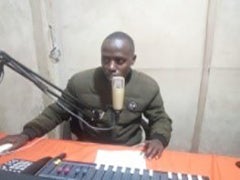
Taboi Emmanuel Kip (Ogiek), 25, is from Kapsokwony, western province of Kenya. He is a graduate of the Business Management and Accounting program at Moi University of Kenya and currently volunteers at the Tulwoob Koony Radio as a presenter, also helping in finance and administration. He is an advocate in the protection of biodiversity and environmental conservation, especially in the area of Indigenous Peoples’ land rights. In 1992, Taboi’s grandfather was forced out of the Chepkitale Indigenous territory. He is currently fighting for reclamation of his heritage land.
His fellowship project, “Community Radio Production,” seeks to educate and improve the livelihood of the Ogiek Peoples. Radio programs will be developed by Indigenous youth who will create awareness and solutions to issues in culture, agriculture, rural development, hygiene and sanitation, education, and local governance, among other topics that may arise during the project term. The project also aims to promote social cohesion among Indigenous people through engaging community experts in domestic violence, conflict resolution, peace building, gender and social inclusion, family life, and moral education. The project will also create a space to explain government policies and programs that promote accountability and transparency for the Indigenous communities in rural areas for development.
Jimena Musicue Casso (Nasa) from Colombia
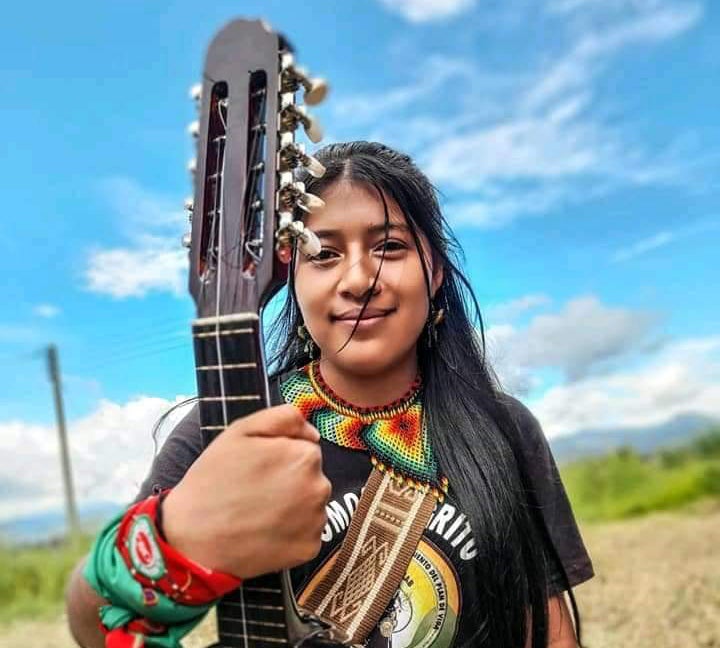
Jimena Musicue Casso (Nasa), 18, is from the northern zone of Cauca of Toribio, Colombia. She recently completed high school and was part of the Ksxaw Üus theater group known as the “Dreams of the Heart.” She is an active member of the women's group "Hilando Thoughts," and a member of Nasa Women's Movement Producing Thoughts, which is a non-profit organization belonging to the Indigenous council of Toribio San Francisco dedicated to generating the empowerment of Indigenous women via economic autonomy and political participation.
Her fellowship, “Supporting the Strengthening of the Women Movement in Toribio,” seeks to enhance the skills of Nasa people from a critical and decolonizing perspective. Capacity building trainings will be delivered to 10 women and 5 men in technical communications tools, radio programming, and audiovisual development. The aim is to strengthen Indigenous communicators in the women’s movement and make visible their struggles and resistance. Fifteen radio programs and two audiovisual productions will be produced and translated in Nasa Yuwe language.
Inamatí Xâne Terenoe Collective (Terena) from Brazil
The Inamatí Xâne Terenoe Collective is a group of Terena youth from Taunay and Ipegue territories composed of seven villages located in the municipality of Aquidauana-Mato Grosso do Sol, Brazil. The members of the collective are Adeir Francelino, 26; Cerizi F Failho, 28; Eliamara Massi, 26; and Jonatas Moreira, 26, who are leaders, educators, communicators, and researchers. The collective was created in March 2022 to strengthen traditional Terena practices through communication that also promote the valorization of Terena identity. They are guided by elders, artisans, herbalists, midwives, and many more knowledge keepers of their community. The Collective shares: “We believe that as youth we have a duty and we can do something so that our identity is not forgotten by future generations. One of the ways is to unite the Traditional Knowledge of our elders with our technical and scientific knowledge acquired at university.”
Their fellowship project, “Kaxunaka ra vemo'u Terenoe” (Strengthening our Terena language), focuses on the protection of the Traditional Knowledge and ancient wisdom of the Terena People in looking toward the future to strengthen Terena identity, culture, language, and defense of land through audiovisual documentation. Interviews will be conducted with Elders and knowledge keepers along with exchanges between Elders and children with the intention of uplifting the stories shared and valuing ancestral roots. Two documentary shorts will be produced as a final product in the Terena language, captioned in Portuguese, and distributed across social media, community radio stations, and the Terena community. The collective aspires to create materials that will encourage the development of Terena language center in strengthening their mother tongue to future generations.
Reyna Selena Escobar Martínez (Nahuatpipil) from El Salvador
Reyna Selena Escobar Martínez (Nahuatpipil), 25, is from the Tacuba community in the department of Ahuachapán, El Salvador. She is an Indigenous leader and communicator who empowers girls and young Indigenous women on their rights. She holds a bacherlors degree in health care, which has allowed her to learn about the harsh reality that Indigenous girls and women endure in their communities in terms of their sexual and reproductive health. Many of the girls that she has encountered in her work become pregnant at an early age, which increased her advocacy in building awareness on prevention and educational resources for girls and young women on sexual and reproductive health. Raised by a single mother, Reyna is passionate about this work and is a role model for girls and youth.
Her fellowship project, “Indigenous Women Have the Right to Decide for Our Sexual and Reproductive Health,” aims to build consciousness on sexual and reproductive rights and education through productions of radio spots and short video clips. She will deliver five capacity building workshops with 25 youth on gender equity and equality and sexual reproductive rights, highlighting the history of the resistance of Indigenous women. She will also organize a screening of the short videos that are produced for 50 Indigenous women, followed by a collective discussion on how they can organize to claim their rights.
Daje Kapap Eypi Audiovisual Collective (Munduruku) from Brazil
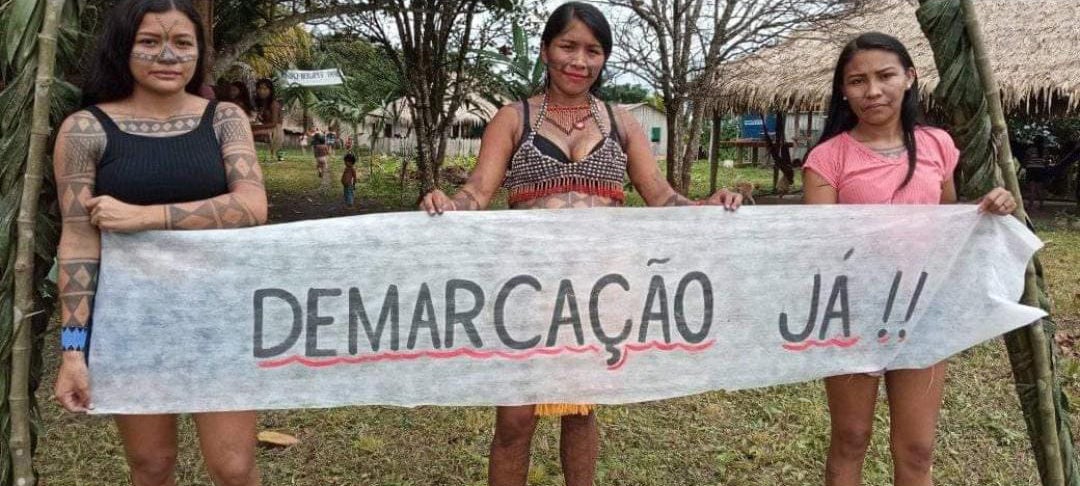
The Daje Kapap Eypi Collecitve, which means “The Passage of the Pigs,” is an allusion to a sacred place for the Munduruku Peoples. The Collective is composed of Gilmara Akay, 27; Rilcélia Akai, 23; and Beka Saw Munduruku, 19, who are filmmakers and land defenders. In 2014, during the first phase of self-demarcation of the Munduruku Indigenous territory Daje Kapap Eypi, also known as Sawré Muybu, the youth began to learn to use cameras. From there, Daje Kepap Eypi was born, a collective that honors the struggle of the Munduruku Peoples and documents the invasions of illegal logging in the region through films and other audiovisual media with the objective of defending the territory. Their work is dedicated to defending their territory to guarantee the survival of their ancestral values to the future unborn generations.
Their fellowship project, “Uprising of Munduruku Girls,” focuses on making visible the struggles in defense of forests and water resources in their territory by creating short documentaries to record the impacts of logging and environmental pollution that has interrupted food security and livelihoods for the Munduruku Peoples, also highlighting the importance of protecting and safeguarding Mother Earth. Footage will be recorded to address global awareness of the severity of environmental damage and the violations of Indigenous Peoples’ rights as guardians of the Amazon.
